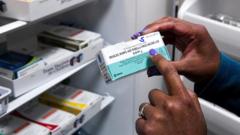According to a recent WHO and Unicef report, measles cases in Europe have reached their highest level in 25 years, fueled by skepticism surrounding vaccinations and setbacks during the COVID-19 pandemic.
"Measles Outbreak Surges to 25-Year High in Europe: WHO Report"

"Measles Outbreak Surges to 25-Year High in Europe: WHO Report"
Health officials warn of rising measles cases due to declining vaccination rates across Europe.
The number of measles cases in Europe has surged dramatically, doubling in the past year and reaching a shocking high not seen since 1997. A detailed report released by the World Health Organization (WHO) in collaboration with the UN children's fund, Unicef, indicates that children under five years old account for over 40% of the cases reported across Europe and central Asia. "Measles is back, and it’s a wake-up call," stated Hans Henri Kluge, WHO’s regional director for Europe, emphasizing the crucial need for high vaccination rates to ensure public health security.
The MMR vaccine, known for its effectiveness—97% against measles, mumps, and rubella—has proven essential in combating this virulent disease, which spreads easily through coughs and sneezes. Symptoms of measles include high fever, sore red eyes, coughing, and sneezing, and it can lead to severe complications, including pneumonia and brain swelling, with potential fatal outcomes. Recent data reveal that there have been 127,350 reported cases of measles in Europe so far in 2024, with at least 38 deaths attributed to the outbreak by March 6.
While cases had been on a decline since 1997, there has been a troubling reversal noted between 2018 and 2019, with a sharp increase in cases observed in 2023-2024 that coincided with a dip in immunization coverage as a result of the COVID-19 pandemic. The WHO warned that vaccination rates in many countries remain below pre-pandemic levels, thus elevating the risk of continued outbreaks. Alarmingly, the European region accounted for one-third of global measles cases in the past year, with Romania and Kazakhstan reporting the highest incidence rates.
This resurgence is not isolated to Europe; recent outbreaks have been reported in the United States and Canada. In the U.S., two fatalities have occurred amidst a resurgence of measles, a disease that was previously declared "eliminated" in the country in 2000. Health authorities attribute the rise in cases to plummeting vaccination rates—data indicates that eight out of ten diagnosed individuals in Europe had not received the necessary vaccinations.
As concern mounts, particularly in the UK where vaccination rates have fallen below the critical 90% threshold for two doses, experts urge citizens to be cautious of misinformation proliferated on social media regarding vaccine safety. Dr. Ben Kasstan-Dabush from the London School of Hygiene and Tropical Medicine highlighted the importance of relying on scientific evidence for vaccine information, particularly in light of how misinformation influenced public health decisions during the COVID-19 vaccination rollout.
As the situation evolves, the WHO and Unicef call on governments, especially in areas experiencing outbreaks, to take immediate action to combat the disease’s spread and prepare for potential cases in regions where measles has not yet arrived.
The MMR vaccine, known for its effectiveness—97% against measles, mumps, and rubella—has proven essential in combating this virulent disease, which spreads easily through coughs and sneezes. Symptoms of measles include high fever, sore red eyes, coughing, and sneezing, and it can lead to severe complications, including pneumonia and brain swelling, with potential fatal outcomes. Recent data reveal that there have been 127,350 reported cases of measles in Europe so far in 2024, with at least 38 deaths attributed to the outbreak by March 6.
While cases had been on a decline since 1997, there has been a troubling reversal noted between 2018 and 2019, with a sharp increase in cases observed in 2023-2024 that coincided with a dip in immunization coverage as a result of the COVID-19 pandemic. The WHO warned that vaccination rates in many countries remain below pre-pandemic levels, thus elevating the risk of continued outbreaks. Alarmingly, the European region accounted for one-third of global measles cases in the past year, with Romania and Kazakhstan reporting the highest incidence rates.
This resurgence is not isolated to Europe; recent outbreaks have been reported in the United States and Canada. In the U.S., two fatalities have occurred amidst a resurgence of measles, a disease that was previously declared "eliminated" in the country in 2000. Health authorities attribute the rise in cases to plummeting vaccination rates—data indicates that eight out of ten diagnosed individuals in Europe had not received the necessary vaccinations.
As concern mounts, particularly in the UK where vaccination rates have fallen below the critical 90% threshold for two doses, experts urge citizens to be cautious of misinformation proliferated on social media regarding vaccine safety. Dr. Ben Kasstan-Dabush from the London School of Hygiene and Tropical Medicine highlighted the importance of relying on scientific evidence for vaccine information, particularly in light of how misinformation influenced public health decisions during the COVID-19 vaccination rollout.
As the situation evolves, the WHO and Unicef call on governments, especially in areas experiencing outbreaks, to take immediate action to combat the disease’s spread and prepare for potential cases in regions where measles has not yet arrived.




















